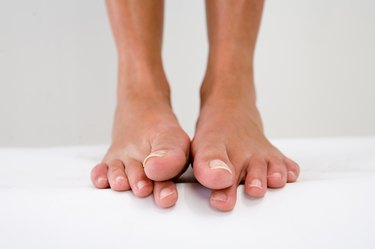
While occasional itching for a few minutes is not serious, an itch that keeps coming back without apparent cause may require medical attention. Frequent itchy toes may not only frustrate and irritate you, but can also indicate serious underlying conditions including diabetes, allergies and gout. While your doctor may prescribe medications to treat these conditions, making changes to your diet may also help manage some of these conditions. Talk to a doctor before making dietary changes to treat your itchy toes.
Athlete's Foot
Video of the Day
Athlete's foot, a fungal infection that develops in the moist areas between your toes, can often manifest as itchy and burning toes. Candida albicans, or yeast, is one of the most common culprits for this condition. Following an anti-candida diet by eliminating sugar from your diet, and reducing the intake of dairy products such as milk and cheese may prevent the growth of this fungus, says University of Maryland Medical Center. This may, in turn, help treat athlete's foot and itchy toes.
Video of the Day
Allergies
Itchy skin and toes are also associated with food allergies that develop as a result of abnormal immune response of your body to certain foods. Shellfish, peanuts and tree nuts are the most common food allergies in adults, while milk, egg, soy, wheat and nuts are the common allergens in children, according to the Cleveland Clinic. The website recommends avoiding the foods that cause the itch to relieve the symptoms.
Diabetes
Increased blood sugar levels because of diabetes can also promote fungal infections such as athlete's foot. Itchy skin in diabetes patients may also occur when the nerves connecting your toes to the brain get damaged, and do not get the message from your brain to secrete sweat, which keeps your skin soft and moist. Dry skin around your toes can crack and cause itching. Keep your diabetes in check by eating whole grains, fruits, vegetables, legumes, nuts and heart healthy fish such as tuna and salmon, states Mayo Clinic.
Gout
Gout is a painful form of arthritis that occurs due to accumulation of uric acid in your joints. The condition commonly affects the joints around your big toe, and as the condition subsides, the skin around the affected area may become itchy and peel. Gout attacks, however, may be prevented by following a diet that limits the formation of uric acid in the body. The gout diet, according to Mayo Clinic, requires you to avoid alcohol, meat and poultry, and instead eat whole grains, plant proteins, low-fat dairy products and drink healthy fluids.
Zinc Deficiency
Deficiency of zinc impairs the breakdown of vitamin A and fatty acids essential for moist, healthy skin. The deficiency can therefore cause scaly skin and itching of feet and toes. Zinc is also required for the proper functioning of the immune system, and deficiency in the mineral can increase your susceptibility to athlete's foot. Changing your diet and consuming foods rich in zinc, such as low-fat dairy products, nuts and oysters, can help prevent zinc deficiency and itchy toes associated with it.